Mazda 2 Hybrid vs Toyota Yaris - Differences and prices compared
Compare performance (116 HP vs 280 HP), boot space and price (21400 £ vs 21900 £ ) at a glance. Find out which car is the better choice for you – Mazda 2 Hybrid or Toyota Yaris?
Costs and Efficiency:
Price and efficiency are often the first things buyers look at. Here it becomes clear which model has the long-term edge – whether at the pump, the plug, or in purchase price.
Mazda 2 Hybrid has a hardly perceptible advantage in terms of price – it starts at 21400 £ , while the Toyota Yaris costs 21900 £ . That’s a price difference of around 437 £.
Both cars consume an average of 3.80 L per 100 km – no difference here.
Engine and Performance:
Power, torque and acceleration say a lot about how a car feels on the road. This is where you see which model delivers more driving dynamics.
When it comes to engine power, the Toyota Yaris has a clearly edge – offering 280 HP compared to 116 HP. That’s roughly 164 HP more horsepower.
In acceleration from 0 to 100 km/h, the Toyota Yaris is significantly quicker – completing the sprint in 5.50 s, while the Mazda 2 Hybrid takes 9.70 s. That’s about 4.20 s faster.
Space and Everyday Use:
Beyond pure performance, interior space and usability matter most in daily life. This is where you see which car is more practical and versatile.
Both vehicles offer seating for 5 people.
In curb weight, Toyota Yaris is minimal lighter – 1090 kg compared to 1180 kg. The difference is around 90 kg.
Boot capacity is identical – both offer 286 L of storage.
When it comes to payload, Toyota Yaris to a small extent takes the win – 525 kg compared to 435 kg. That’s a difference of about 90 kg.
Who wins the race?
The Toyota Yaris proves to be wins the duel decisively and therefore becomes our DriveDuel Champion!
Toyota Yaris is the better all-rounder in this comparison.

Toyota Yaris
Costs and Consumption
View detailed analysis
Engine and Performance
View detailed analysis
Dimensions and Body
View detailed analysis
Mazda 2 Hybrid
The Mazda 2 Hybrid brings Mazda’s trademark driving flair to the city, combining smooth, efficient running with unexpectedly eager handling that keeps short trips engaging. Compact, nicely finished and sensible on running costs, it’s a clever choice for buyers who want the economy of a small car without sacrificing cabin quality or personality.
details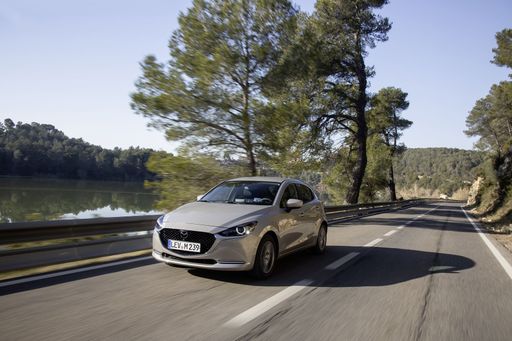
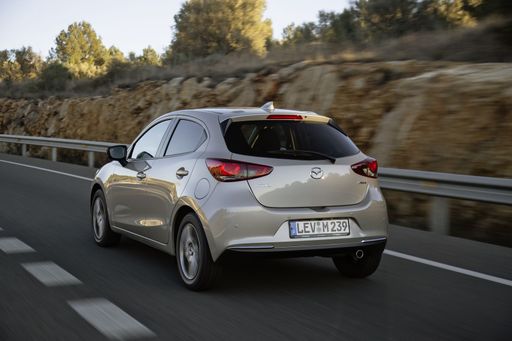
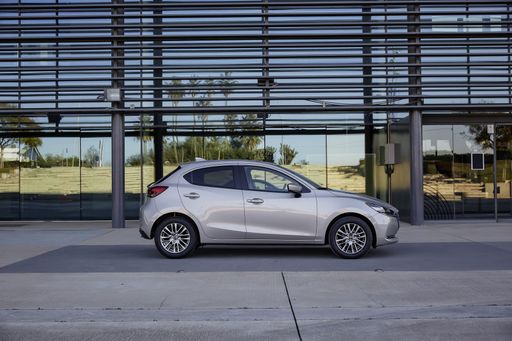
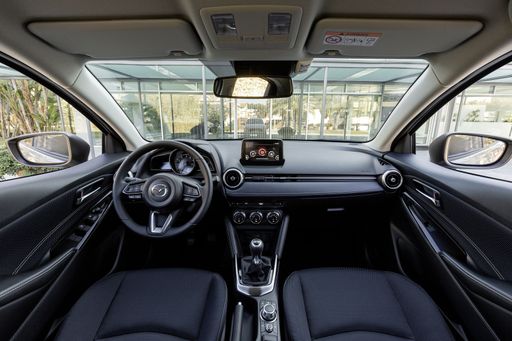
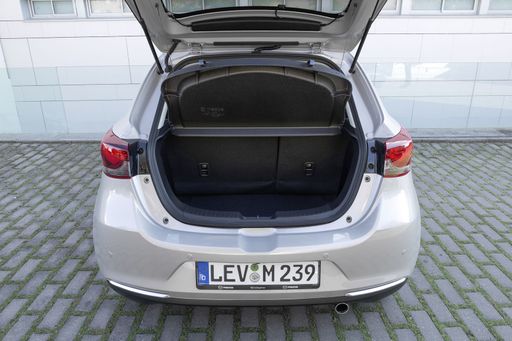
Toyota Yaris
The Toyota Yaris is a sprightly city hatch that packs clever packaging, surprising comfort and fuel-sipping manners into a neat, easy-to-park package. It rewards sensible buyers with low running costs, friendly ergonomics and a forgiving drive, delivered with Japanese reliability and just enough personality to make errands feel a little less ordinary.
details

Costs and Consumption |
|
|---|---|
|
Price
21400 - 28200 £
|
Price
21900 - 46700 £
|
|
Consumption L/100km
3.8 - 4 L
|
Consumption L/100km
3.8 - 9.5 L
|
|
Consumption kWh/100km
-
|
Consumption kWh/100km
-
|
|
Electric Range
-
|
Electric Range
-
|
|
Battery Capacity
-
|
Battery Capacity
-
|
|
co2
87 - 93 g/km
|
co2
87 - 215 g/km
|
|
Fuel tank capacity
-
|
Fuel tank capacity
36 - 50 L
|
Dimensions and Body |
|
|---|---|
|
Body Type
Hatchback
|
Body Type
Hatchback
|
|
Seats
5
|
Seats
4 - 5
|
|
Doors
-
|
Doors
3 - 5
|
|
Curb weight
1180 kg
|
Curb weight
1090 - 1356 kg
|
|
Trunk capacity
286 L
|
Trunk capacity
141 - 286 L
|
|
Length
-
|
Length
3940 - 3995 mm
|
|
Width
1745 mm
|
Width
1745 - 1805 mm
|
|
Height
-
|
Height
1455 - 1500 mm
|
|
Max trunk capacity
-
|
Max trunk capacity
935 L
|
|
Payload
435 kg
|
Payload
289 - 525 kg
|
Engine and Performance |
|
|---|---|
|
Engine Type
Full Hybrid
|
Engine Type
Full Hybrid, Petrol
|
|
Transmission
Automatic
|
Transmission
Automatic, Manuel
|
|
Transmission Detail
CVT
|
Transmission Detail
CVT, Manual Gearbox, Automatic Gearbox
|
|
Drive Type
Front-Wheel Drive
|
Drive Type
Front-Wheel Drive, All-Wheel Drive
|
|
Power HP
116 HP
|
Power HP
116 - 280 HP
|
|
Acceleration 0-100km/h
9.70 s
|
Acceleration 0-100km/h
5.5 - 9.7 s
|
|
Max Speed
-
|
Max Speed
175 - 230 km/h
|
|
Torque
-
|
Torque
390 Nm
|
|
Number of Cylinders
3
|
Number of Cylinders
3
|
|
Power kW
85 kW
|
Power kW
85 - 206 kW
|
|
Engine capacity
1490 cm3
|
Engine capacity
1490 - 1618 cm3
|
General |
|
|---|---|
|
Model Year
2025
|
Model Year
2024 - 2025
|
|
CO2 Efficiency Class
B
|
CO2 Efficiency Class
B, G
|
|
Brand
Mazda
|
Brand
Toyota
|
Is the Mazda 2 Hybrid offered with different drivetrains?
The Mazda 2 Hybrid is offered with Front-Wheel Drive.




